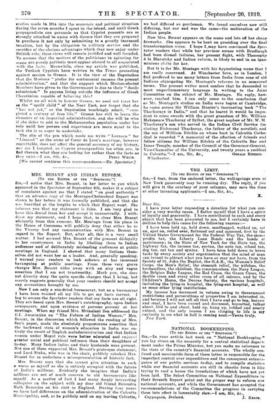MRS. BESANT AND INDIAN REFORM.
(To THE EDITOR or THE " SPECTATOR.") notice that Mrs. Besant, in her letter to you which appeared in the Spectator of September 6th, makes it a subject of complaint against me that I stated " on good authority " that an advance copy of the Montagu-Chelmsford Report was shown to her before it was formally published, and that she was horrified at the lengths to which that Report went. She informs you that my statement is false. I am 'very glad to have this denial from her and accept it unreservedly. I with- draw my statement, and I hope that, to clear Mrs. Besant efficiently from this rumour, Mr. Montagu from his place in the House of Commons will publicly deny that either he or the Viceroy had any communication with Mrs. Besant in regard to the Report. But, after all, this is a very small matter. I had accused Mrs. Besant of the grossest disloyalty to her countrymen in India by libelling them to Indian audiences and of deliberately misleading audiences at public meetings in England. I showed that many Indians them- selves did not want her as a leader. And, generally speaking. I warned your readers to look askance at her incessant haranguing at public meetings. From these very grave charges Mrs. Besant rides away with an airy and vague assertion that I am not trustworthy. Mark you, she does not directly deny the quite specific charges that I bring, but merely suggests generally that your readers should not accept any accusations brought by me.
Now I am only a sun-dried bureaucrat, but as a bureaucrat I have been trained all my life to get my facts correct. I beg to assure the Spectator readers that my facts are all right. They are based upon Mrs. Besant's autobiography, upon Indian newspapers, and upon evidence of persons present at her meetings. When my friend Mrs. Mrinalani Sen addressed the E.I. Association on " The Future of Indian Women," Mrs. Besant, in the discussion which followed the reading of Mrs. Sen's paper, made the absolutely preposterous assertion that the backward state of women's education in India was en- tirely the result of English maladministration and that Indian women under Mogul rule were better educated and enjoyed grdater social and political influence than their daughters of .to-day. Many Indian ladies and their husbands were present. Not one of them supported Mrs. Besant's grotesque statement, and Lord Sinha, who was in the chair, publicly rebuked Mrs. Besant for so audacious a misrepresentation of historic fact.
Mrs. Besant says that she cannot give attention to such a worm as myself as she is entirely occupied with the future of India's millions. Evidently she imagines that India's millions are not of much concern to old bureaucrats like myself. As a matter of fact I had many deeply interesting colloquies on the subject with my dear old friend Snrendra Nath Banerjea on his visit to England. During four years we have had differences on the administration of the Calcutta Municipality, and, as he publicly said on my leaving Calcutta, we had differed as gentlemen. We found ourselves now still differing, but our end was the same—the melioration of the Indian people.
Now Mrs. Besant appears on the scene and lets off her cheap fireworks. She appears to be bent on presiding over the final transformation scene. I hope I.may have convinced the Spec- tator readers that while her previous scenes with Bradlaugh had been dismal failures, her present flight, with Theosophy a /a Blavatsky and Indian reform, is likely to end in an igno- minious chfite for her.
But it is for Mr. Montagu with his hypnotising scene that I am really concerned. At Winchester here, as in London, find proffered to me many letters from India from sons of old Indians objurgating Mr. Montagu's reforms in no measured terms. The present writer must confess that he descended to most unparliamentary language in writing to the Joint Committee on the subject of Mr. Montagu. No reply, how- ever, reached him. I can only come to the conclusion that as Mr. Montagu's studies on India were begun at Cambridge, he came across Sir William Hunter's fascinating book "The Thackerays in India," and that he learnt it would be impu- dent to cross swords with the great grandson of Mr. William Makepeace Thackeray of Sylhet, the great nephew of Mr. W. M. Thackeray's son who served in the Indian Civil Service (in- cluding Richmond Thackeray, the father of the novelist), and the eon of William Ritchie on whose bust in Calcutta Cathe- dral is recorded "A memorial of the affection of friends and fellow citizens for William Ritchie of the Calcutta Bar and Inner Temple, member of the Council of the Governor-General, Vice-Chancellor of the University, and twenty years a resident in Calcutta."—I am, Sir, &o., GERALD RITORYB. Winchester.






































 Previous page
Previous page